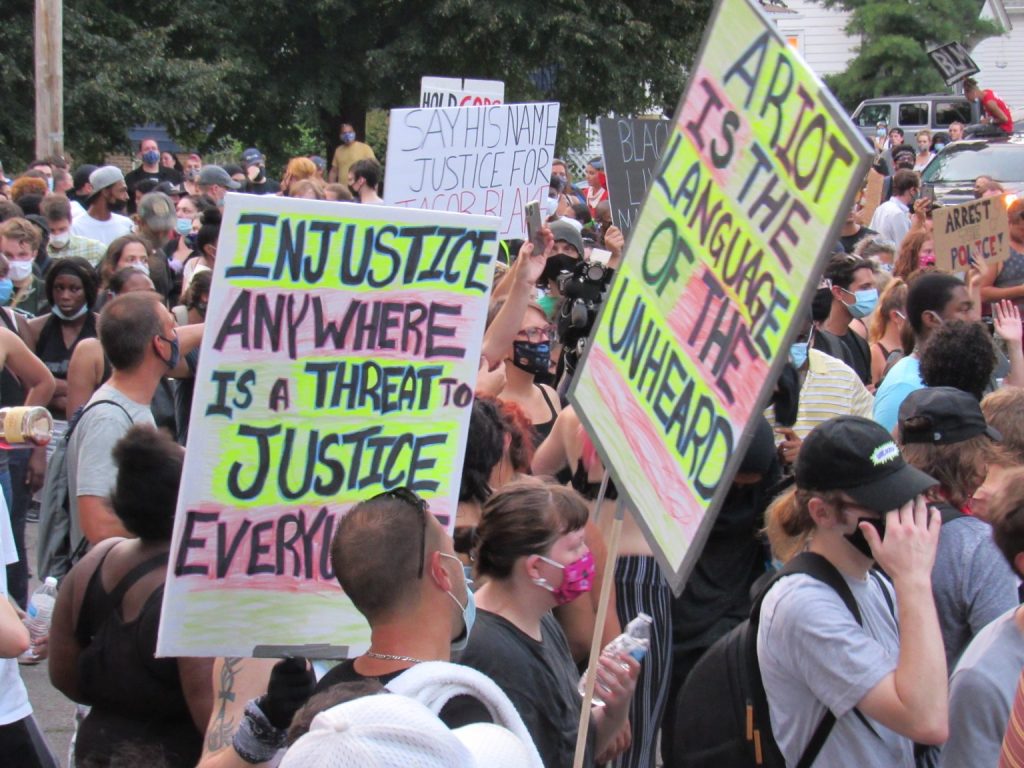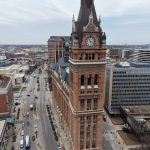Bill Makes Protestors Liable for Vandalism By Others
Republicans proposed 'riot' law will chill free speech, critics charge.

Protesters gather in Kenosha the second night of protests on August 24th, 2020. This was before the clashes with police later that night. (Photo by Isiah Holmes/Wisconsin Examiner)
Imagine you hear about a protest in your community and, curious, you join your neighbors who are marching in the street. Although the protest is loud and slows down traffic, it appears peaceful and non-violent. Then suddenly, someone throws a rock or spray-paints a building, and now you find yourself among those apprehended for felony rioting, regardless of whether you committed an act of vandalism or know who did.
Civil rights advocates fear such a scenario if under a Republican bill that defines a riot as a public disturbance, an act of violence or a “clear and present danger” of property destruction or personal injury involving at least three people. A similar bill was introduced in 2017 by Rep. John Spiros (R-Marshfield). A new version is (AB-88), authored by Rep. Shae Sortwell (R-Two Rivers) and Sen. Dan Feyen (R- Fond du Lac).
People who say their property was damaged or vandalized during what the bill defines as a “riot” would also be able to seek civil damages from people or organizations that “provided material support or resources with the intent that such support or resources would be used to perpetrate the offense,” under the bill. It also prohibits government officials with direct authority over law enforcement agencies from limiting or restricting those agencies’ ability to quell vandalism or rioting, as defined by the bill.
Jon McCray Jones, a policy analyst at the American Civil Liberties Union (ACLU) of Wisconsin is concerned that the bill’s definition of a “riot” is too vague. “Using that definition, a riot could be three teenagers driving around in a car knocking off mail boxes,” McCray Jones told Wisconsin Examiner. “Technically, with this definition, a riot could be a food fight.” The bill’s language concerning people who “urge, promote, organize, encourage, or instigate others to commit a riot” is also vague according to McCray Jones, who says this aspect of the bill would open protest leaders and organizers up to criminal and civil liability, regardless of their involvement in rioting.
Sortwell and Feyen did not respond to requests for comment for this story. In written testimony before the Assembly Committee on Judiciary on May 7, both lawmakers said that riots have become more common in recent years. “We saw the destructive riots a few years ago in several metropolitan areas, including right here in Madison and Kenosha,” said Sortwell, referring to George Floyd-inspired protests and unrest in 2020. “Taking a walk down State Street, one would see busted doors and windows of businesses, products stolen, and a smashed statue of a Civil War hero. Several business owners, employees, and citizens had their lives upended.”
Feyen said that “peaceful protests are a cornerstone of our public discourse and will always be protected under the First Amendment, but a line needs to be drawn when those protests go from being peaceful to being destructive and violent.” Although the bill does not mention specific protests, Feyen wrote, “stricter penalties are needed to deter protesters from crossing that line from protest to property destruction, vandalism, arson, and physical violence.”
Although scenes of burning buildings and looted stores received a lot of news coverage in 2020, studies suggest that at least 96% of Black Lives Matter protests during the movement’s peak in May and June of 2020 were peaceful. Reports by TMJ4 found that 74.3% of the nearly 200 people who’d been placed on an intelligence list by police in Milwaukee county that year had never been charged with a misdemeanor or felony. Some reports, however, using data derived from insurance claims, estimate that as much as $2 billion in damage nationally occurred due to protests in 2020.
Some residents of Kenosha – a city referenced by the bill’s authors – recall how months of non-violent protest in Kenosha after Floyd’s death were overshadowed by the unrest that occurred in August 2020. The shooting of Jacob Blake by Kenosha officer Rusten Sheskey, which paralyzed Blake, led to days of protest and unrest, millions of dollars worth of property destruction, and ended when then-17-year-old Kyle Rittenhouse fatally shot two people and wounded another, in what a jury later ruled was an act of self-defense.
During committee hearings on May 7, Sortwell said that the bill seeks to punish not only people who commit vandalism but also “those people who put together the riot.”
Several groups have either lobbied or spoken out against the bill. The Wisconsin Civil Justice Council submitted written testimony opposing the bill on the behalf of “16 business associations working together on civil liability matters.” The council said that the bill would allow for civil compensation for emotional distress stemming from property destruction, noting that emotional damages are generally limited. AB-88 would also allow for any civil compensation to include attorneys’ fees, which would be another departure from current law, the council wrote. Others spoke against the bill in person on May 7, pointing to the bill’s broad language and the chilling effect it could have on political movements.
“This bill is just a blatant attempt to stop people from protesting,” said McCray Jones. “This is a way to silence organizers from fighting for political change and threatening the status quo in power.” Organizers could potentially be sued for anything that happens at a protest, or even just for transporting someone to a protest that later turns into a riot, as defined under the bill.
What counts as urging or promoting a riot is broad enough to include common protest chants, like “no justice, no peace,” McCray Jones said. “And if you have ambitious or politically motivated district attorneys…politically motivated prosecutors, the vagueness of this bill could be weaponized … free speech now gets criminally turned into inciting a riot.”
McCray Jones added that he wonders what a police figure like former Milwaukee PD Chief Harold Breier — notorious for targeting and surveilling Black, brown and LGBTQ communities — would have been able to accomplish had such a law been at his disposal.
As police departments develop their social media surveillance capabilities, it’s possible under the bill that making posts encouraging people to attend a protest could be seen as an attempt to “urge, promote, organize, encourage, or instigate” a riot under the bill. After the protests of 2020, some agencies that monitored protesters enacted new intelligence-gathering policies to help prevent broad, ideology-based surveillance.
“I think that right now this moment gives us a very opportune chance to highlight the importance of protecting the privacy of protesters here in Wisconsin,” McCray Jones told Wisconsin Examiner. McCray Jones said he hopes debate about the bill will become “a jumping off point to talk about not just data privacy for protesters, not just privacy from law enforcement for marginalized communities, but what does it look like to re-think our position on surveillance in the midst of this regime in D.C. that is blatantly ignoring due process, the rule of law, and civil rights.”
Republican riot bill could have chilling effect, advocates warn was originally published by the Wisconsin Examiner.
If you think stories like this are important, become a member of Urban Milwaukee and help support real, independent journalism. Plus you get some cool added benefits.






















These small-town fascists are afraid to hear and see the righteous anger of the people. We will not be silenced!
How long before we see attack dogs and fire hoses?
I wonder if these elected officials would have favored these measures for the Jan. 6 terrorists…oops, tourists.
Isn’t Sortwell the Republican Party’s version of Marjorie Taylor Green? I wonder if he believes in Israeli space lasers.